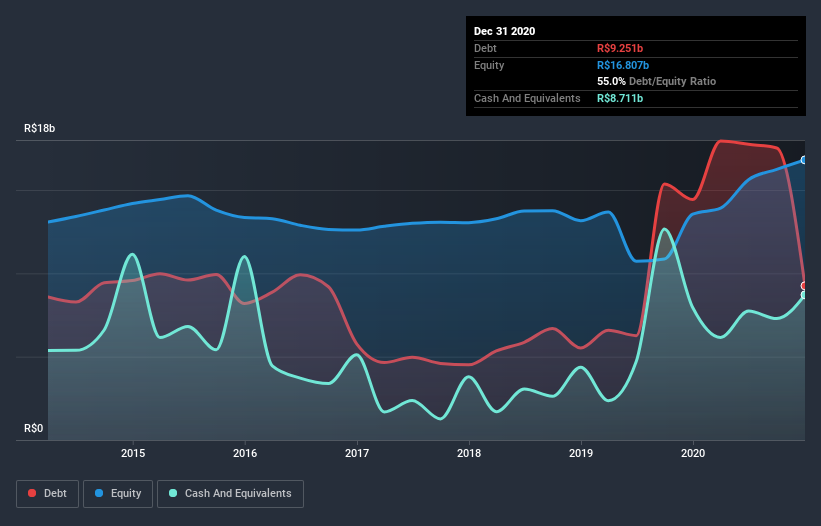- Brazil
- /
- Food and Staples Retail
- /
- BOVESPA:PCAR3
We Think Companhia Brasileira de Distribuição (BVMF:PCAR3) Is Taking Some Risk With Its Debt

David Iben put it well when he said, 'Volatility is not a risk we care about. What we care about is avoiding the permanent loss of capital.' It's only natural to consider a company's balance sheet when you examine how risky it is, since debt is often involved when a business collapses. We note that Companhia Brasileira de Distribuição (BVMF:PCAR3) does have debt on its balance sheet. But should shareholders be worried about its use of debt?
When Is Debt A Problem?
Generally speaking, debt only becomes a real problem when a company can't easily pay it off, either by raising capital or with its own cash flow. If things get really bad, the lenders can take control of the business. While that is not too common, we often do see indebted companies permanently diluting shareholders because lenders force them to raise capital at a distressed price. Having said that, the most common situation is where a company manages its debt reasonably well - and to its own advantage. The first step when considering a company's debt levels is to consider its cash and debt together.
See our latest analysis for Companhia Brasileira de Distribuição
What Is Companhia Brasileira de Distribuição's Net Debt?
The image below, which you can click on for greater detail, shows that Companhia Brasileira de Distribuição had debt of R$9.25b at the end of December 2020, a reduction from R$14.4b over a year. However, it also had R$8.71b in cash, and so its net debt is R$540.0m.

How Healthy Is Companhia Brasileira de Distribuição's Balance Sheet?
We can see from the most recent balance sheet that Companhia Brasileira de Distribuição had liabilities of R$18.5b falling due within a year, and liabilities of R$18.0b due beyond that. Offsetting these obligations, it had cash of R$8.71b as well as receivables valued at R$2.03b due within 12 months. So its liabilities total R$25.7b more than the combination of its cash and short-term receivables.
The deficiency here weighs heavily on the R$6.70b company itself, as if a child were struggling under the weight of an enormous back-pack full of books, his sports gear, and a trumpet. So we definitely think shareholders need to watch this one closely. After all, Companhia Brasileira de Distribuição would likely require a major re-capitalisation if it had to pay its creditors today.
We use two main ratios to inform us about debt levels relative to earnings. The first is net debt divided by earnings before interest, tax, depreciation, and amortization (EBITDA), while the second is how many times its earnings before interest and tax (EBIT) covers its interest expense (or its interest cover, for short). This way, we consider both the absolute quantum of the debt, as well as the interest rates paid on it.
Given net debt is only 0.15 times EBITDA, it is initially surprising to see that Companhia Brasileira de Distribuição's EBIT has low interest coverage of 2.2 times. So while we're not necessarily alarmed we think that its debt is far from trivial. Pleasingly, Companhia Brasileira de Distribuição is growing its EBIT faster than former Australian PM Bob Hawke downs a yard glass, boasting a 191% gain in the last twelve months. There's no doubt that we learn most about debt from the balance sheet. But ultimately the future profitability of the business will decide if Companhia Brasileira de Distribuição can strengthen its balance sheet over time. So if you're focused on the future you can check out this free report showing analyst profit forecasts.
Finally, a business needs free cash flow to pay off debt; accounting profits just don't cut it. So we clearly need to look at whether that EBIT is leading to corresponding free cash flow. Looking at the most recent three years, Companhia Brasileira de Distribuição recorded free cash flow of 44% of its EBIT, which is weaker than we'd expect. That weak cash conversion makes it more difficult to handle indebtedness.
Our View
We feel some trepidation about Companhia Brasileira de Distribuição's difficulty level of total liabilities, but we've got positives to focus on, too. For example, its EBIT growth rate and net debt to EBITDA give us some confidence in its ability to manage its debt. Taking the abovementioned factors together we do think Companhia Brasileira de Distribuição's debt poses some risks to the business. So while that leverage does boost returns on equity, we wouldn't really want to see it increase from here. When analysing debt levels, the balance sheet is the obvious place to start. However, not all investment risk resides within the balance sheet - far from it. For example Companhia Brasileira de Distribuição has 4 warning signs (and 1 which is concerning) we think you should know about.
Of course, if you're the type of investor who prefers buying stocks without the burden of debt, then don't hesitate to discover our exclusive list of net cash growth stocks, today.
When trading Companhia Brasileira de Distribuição or any other investment, use the platform considered by many to be the Professional's Gateway to the Worlds Market, Interactive Brokers. You get the lowest-cost* trading on stocks, options, futures, forex, bonds and funds worldwide from a single integrated account. Promoted
New: AI Stock Screener & Alerts
Our new AI Stock Screener scans the market every day to uncover opportunities.
• Dividend Powerhouses (3%+ Yield)
• Undervalued Small Caps with Insider Buying
• High growth Tech and AI Companies
Or build your own from over 50 metrics.
This article by Simply Wall St is general in nature. It does not constitute a recommendation to buy or sell any stock, and does not take account of your objectives, or your financial situation. We aim to bring you long-term focused analysis driven by fundamental data. Note that our analysis may not factor in the latest price-sensitive company announcements or qualitative material. Simply Wall St has no position in any stocks mentioned.
*Interactive Brokers Rated Lowest Cost Broker by StockBrokers.com Annual Online Review 2020
Have feedback on this article? Concerned about the content? Get in touch with us directly. Alternatively, email editorial-team (at) simplywallst.com.
About BOVESPA:PCAR3
Companhia Brasileira De Distribuicao
Engages in the operation of supermarkets, specialized stores, and department stores in Brazil.
Undervalued low.


